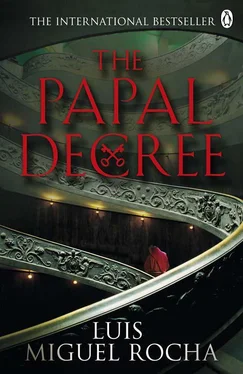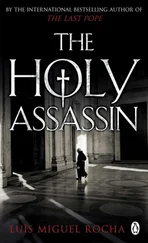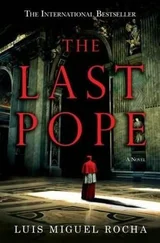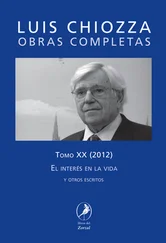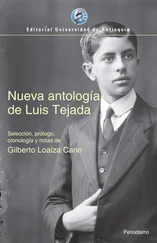Luis Rocha - Papal decree
Здесь есть возможность читать онлайн «Luis Rocha - Papal decree» весь текст электронной книги совершенно бесплатно (целиком полную версию без сокращений). В некоторых случаях можно слушать аудио, скачать через торрент в формате fb2 и присутствует краткое содержание. Жанр: Триллер, на английском языке. Описание произведения, (предисловие) а так же отзывы посетителей доступны на портале библиотеки ЛибКат.
- Название:Papal decree
- Автор:
- Жанр:
- Год:неизвестен
- ISBN:нет данных
- Рейтинг книги:4 / 5. Голосов: 1
-
Избранное:Добавить в избранное
- Отзывы:
-
Ваша оценка:
- 80
- 1
- 2
- 3
- 4
- 5
Papal decree: краткое содержание, описание и аннотация
Предлагаем к чтению аннотацию, описание, краткое содержание или предисловие (зависит от того, что написал сам автор книги «Papal decree»). Если вы не нашли необходимую информацию о книге — напишите в комментариях, мы постараемся отыскать её.
Papal decree — читать онлайн бесплатно полную книгу (весь текст) целиком
Ниже представлен текст книги, разбитый по страницам. Система сохранения места последней прочитанной страницы, позволяет с удобством читать онлайн бесплатно книгу «Papal decree», без необходимости каждый раз заново искать на чём Вы остановились. Поставьте закладку, и сможете в любой момент перейти на страницу, на которой закончили чтение.
Интервал:
Закладка:
Whenever possible, Ursino took care to send a relic of the saint that the new church celebrated. A piece of Saint Andres’s tibia if the church was dedicated to him, and if one existed in the thousands of drawers that filled the giant cases with such relics. Of course, that most sacred archive contained only one of Saint Andres’s fingers, part of a skull, and pieces of the cross on which he was martyred, all sent to Patras, where he was patron, decades ago.
He was diligent, yes, but the Milanese Ursino had a fault. He wasn’t very sociable, perhaps from spending so much time alone caring for the relics, the requests, and the new sacred bones that arrived less frequently now that there were fewer saints. The protocol had become so difficult that today it was extremely hard to pass from the level of sinner to the society of saints.
Although he would deny it if asked, the requests for relics were fewer now, too. Forty years ago he had more than one request a day: a piece of Saint Jerome’s radial, a splinter from Saint Margaret’s wheel, or Saint Nicolas’s metatarsal — back when he was a saint, not long, since he ceased being one under Paul VI. Now Ursino passed weeks in which all he did was organize the immaculate archive of relics so that he knew exactly where something was stored in the immense cases that guarded such sacred content.
In earlier days the schedule was tight for the amount of work he had. Lots of discipline, rules, and organization were necessary to fulfill all the requests and sanctify thousands of Catholic churches around the world. Now he had the luxury of looking through the shelves and inventing things to occupy his time.
A portrait of Pope Benedict dominated the wall near his dark oak desk. Working in front of the wall, he often looked at it. He was an austere figure, unhappy, without joy, or charisma, but a good man. He had dealt with him a few times over the course of the last twenty years, and knew that the Holy Father was a very educated, intelligent man who wanted only to improve the church.
‘Is it too late for an old grump?’ Ursino heard a friendly voice behind him.
The Milanese didn’t turn around, and continued to sort some of the vertebrae of Saint Ephigenia, a contemporary of Jesus, into some small linen bags.
‘I can ask the same. Has the Austrian iceman come to see me?’
‘I had a meeting that lasted all night, and now I’m going to rest,’ Hans Schmidt explained.
Ursino got up, approached Schmidt, and embraced him. ‘It’s been a long time, old friend.’ He held up a linen bag. ‘I’m waiting for a telephone call.’
‘Late, it seems.’
Ursino pulled out a chair and invited Schmidt to sit. ‘Are you still running around with crazy ideas in your head?’
‘What do you call a crazy idea?’ Schmidt asked.
‘I read your writings. A little avant-garde for me. The idea of the observer over the thinker made me nervous.’
Ursino sat in his chair and sighed.
‘They’re ideas,’ Hans replied without further elaboration.
Ursino sniffed and stuck a finger in his nose to remove what was there. Forgivable manners for someone who worked alone for decades, and surely not a sin in the eyes of our Lord God. ‘The idea that my thoughts were not my own went over my head. I couldn’t understand it.’
Hans smiled. ‘Have you ever done something that was contrary to the will of your inner voice?’
Ursino thought a few moments in doubt and rubbed his chubby belly. ‘Yeah.’
‘Your inner voice is the thinker. That which didn’t hear the voice is the observer, or… you.’
‘Are you telling me I’m two people? One is already too much for me,’ Ursino joked impolitely with a grin.
‘No, Ursino. We’re only the observer,’ Schmidt explained, ‘but we think we’re the thinker, and we’re prisoners of our thoughts when ultimately our thought is simply a reasoning to help us from a practical point of view.’
‘Do you control the thinker?’
‘Totally.’
They didn’t speak for a few moments. Ursino mulled over what his friend had said and bit his nails.
‘Let’s not talk about this anymore or I’ll be invited to keep your society tomorrow morning at the hearing.’ He meant it as a joke, but didn’t manage to smile. When the last word left his mouth, Ursino felt his observation was in bad taste. ‘Are you prepared?’
‘For what?’ Hans asked.
‘For the hearing tomorrow.’
‘Tomorrow is only tomorrow. Now I’m simply here with you.’ He looked Ursino in the eye, very attentively, very calmly.
Ursino sniffed again and sighed. ‘On your way, and don’t contaminate me with those ideas.’
‘Nice seeing you,’ Schmidt said, getting up.
The phone rang abruptly at that moment, and Ursino answered it. ‘Hello, Ursino.’
Whatever had been said on the other end of the line transformed Ursino in a way that left him confused and indisposed. When he hung up, he raised his hand to his chest. He felt his heart would burst.
Hans looked apprehensively at him and tried to help. ‘What’s the matter, my friend?’
Ursino felt like fainting. It was difficult to breathe, shivers ran up his spine.
‘What’s the matter, Ursino?’ Schmidt’s voice was more insistent.
‘They know about the bones,’ Ursino stammered.
‘What bones?’
Ursino stopped suddenly, as if he had been miraculously cured. He no longer panted or felt palpitations. He started pacing back and forth, thinking.
‘Call the secretary of state, please,’ the curator of relics asked him.
Schmidt quickly picked up the phone and dialed the extension he knew by heart. Trevor took time answering before he was informed of the urgency to call Tarcisio. The assistant assured them he’d get Tarcisio immediately.
‘They’re waking Tarcisio. Are you going to tell me what happened? Who are they? What bones are you talking about?’
Ursino continued thinking, thinking, thinking, until he paused and looked very seriously at Hans Schmidt. ‘The bones of Christ.’
23
The nausea turning her stomach made her vomit empty gasps of nothing. Try as she might to expel the sickness she felt in her stomach, Sarah succeeded only in dry heaves. She bent over the not very private toilet of the Learjet. She had started to feel bad as soon as they took off from Fiumicino. Leaving the ground provoked a sickening dizziness that made her press against the back of the seat. She tried to find the most horizontal position possible, which was still too vertical, and she knew the nausea was coming. Even before the plane had reached its cruising altitude, Sarah had unbuckled the seat belt and run for the toilet.
It must have taken half an hour to compose herself again. As suddenly as the nausea had come on, it disappeared.
She returned to the cabin, red-faced, overheated, and aching all over. The table in front of her seat held a tray with a teapot, cup and saucer, and a roll.
‘Sit down, dear,’ the comforting voice of Myriam said. ‘I asked them to make you both some chamomile tea. Drink it. It’ll make you feel better,’ she added with a knowing smile.
That ‘both’ upset Sarah, since she’d tried to hide it. The word hit her in the face and spread to the rest of her body. Could it be? Was she carrying someone with her in her womb? Was she pregnant?
The feeling of happiness that all future mothers supposedly feel was not there. The feeling Sarah experienced was panic, with no joy. Was she normal? She remembered Francesco just then and how anxious he must be without news of her. At once she imagined him at her side, she with an enormous belly almost at the end of her third trimester, soon to embark on an unknown parental sea. She wanted to force a smile, to feel a minuscule portion of happiness, anything positive, but couldn’t. Worse, she didn’t want it to be true. She enjoyed Francesco, admired him, but she didn’t want to have a child with him. Rafael’s image invaded her thoughts. She enjoyed Francesco, respected him… wanted to enjoy… to admire. She should want to have a child with him. Francesco was a marvelous man. He’d be a great father and loving husband… but Rafael’s image would not leave her mental screen.
Читать дальшеИнтервал:
Закладка:
Похожие книги на «Papal decree»
Представляем Вашему вниманию похожие книги на «Papal decree» списком для выбора. Мы отобрали схожую по названию и смыслу литературу в надежде предоставить читателям больше вариантов отыскать новые, интересные, ещё непрочитанные произведения.
Обсуждение, отзывы о книге «Papal decree» и просто собственные мнения читателей. Оставьте ваши комментарии, напишите, что Вы думаете о произведении, его смысле или главных героях. Укажите что конкретно понравилось, а что нет, и почему Вы так считаете.
